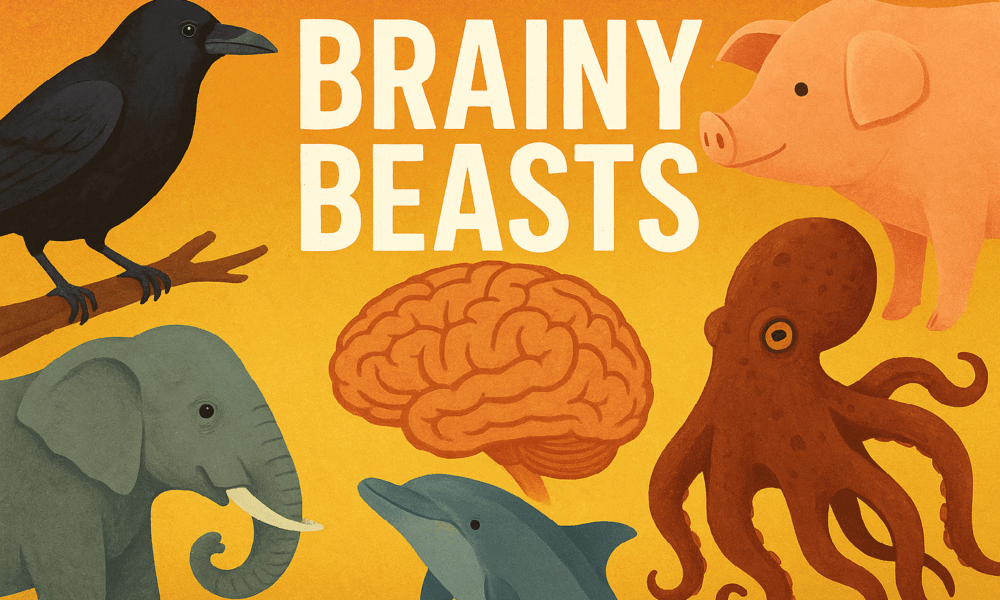
Brainy Beasts: The Surprising Smarts of Crows, Pigs, and Dolphins
Why animal intelligence isn’t just cute and matters for us all
When we think of “IQ,” most of us picture humans taking standardized tests. But intelligence isn’t exclusive to our species. Across the animal kingdom, creatures like crows, pigs, dolphins, and many others demonstrate remarkable cognitive powers.
By studying their problem-solving, memory, social learning, and self-awareness, we gain insight not just into animals’ minds but into the complex ways life on Earth adapts, collaborates, and thrives. Understanding animal intelligence helps us reimagine our relationships with nature, inspiring greater empathy, ethical treatment, and smarter approaches to conservation and coexistence.
The Many Shades of Animal Intelligence
Scientists don’t measure animal IQ with an actual “IQ score.” Instead, the Environmental Literacy Council explains that they assess cognitive sophistication through tests of problem‑solving, tool use, memory, social learning, and even self-awareness, combined with comparisons of brain size relative to body size (the encephalization quotient).
This approach reveals striking intelligence in animals traditionally underestimated.
Corvids: Crows That Never Forget
Crows (and their corvid cousins) are among the most intellectually gifted birds. Research by John Marzluff at the University of Washington has shown that crows can not only recognize individual human faces but hold grudges for years. They remember humans who have posed a threat, such as capturing or harming them, and scold them as a survival strategy to avoid future danger. In fact, crows have been shown to continue scolding a person wearing a mask decades later, even sharing that “anger” culturally across generations.
These birds are also adept tool‑users. They fashion twigs, leaves or wire into hooks to reach food in hard-to-access places, plan multi-step strategies, and solve puzzles that rival what primates can do. Their brain structure is remarkably efficient: despite being small, their neuron density rivals that of apes and monkeys.
Pigs: More Than Barnyard Buddies
Pigs may be underestimated but their intelligence is nothing to snort at. In classic mirror tests, farm pigs spent time understanding their reflections and then used that knowledge to locate food behind barriers, relying on the mirror to guide them.
Behavioral research backs this up: pigs show evidence of “assessment awareness,” meaning they can form mental models of their own bodies and their surroundings. In addition, studies on pig cognition show excellent memory, social learning, and communication skills.
These findings challenge stereotypes and suggest that pigs deserve more ethical consideration in farm welfare, policy, and how we treat them as individuals.
Dolphins: Deep Thinkers of the Sea
In the marine world, dolphins are widely celebrated for their intelligence, and for good reason. Behavioral scientists Diana Reiss and Lori Marino famously administered the mirror self‑recognition test to bottlenose dolphins. Unlike many animals, these dolphins used the mirrors to inspect marks placed on their bodies – strong evidence for self-awareness.
Beyond that, dolphins communicate with a sophisticated system of whistles and clicks, form tight-knit social groups, teach one another, and cooperate to solve complex problems. Scientific sources generally report that their brains are large and highly folded, supporting high-level cognition, a kind of intelligence that evolved independently, in parallel to that of primates.
More Marvels: Apes, Elephants, and Octopuses
The intelligence of great apes, elephants, and octopuses adds even more wonder to the animal kingdom. Multiple peer-reviewed studies in primatology and cognitive science reveal that chimpanzees and orangutans exhibit advanced problem-solving, tool use, and even elements of culture, passing learned behaviors from one generation to the next.
According to National Geographic, elephants, with their massive, intricately folded brains, display exceptional memory, empathy, and self-awareness. They mourn their dead, recognize themselves in mirrors, and can cooperate in problem-solving tasks.
Meanwhile, octopuses demonstrate astonishing cognitive feats in invertebrates. Numerous scientific articles affirm they can solve mazes, open jars, mimic other species, and exhibit short- and long-term memory. They do all this with a nervous system spread across their arms rather than centralized in a single brain.
Together, these species remind us that intelligence is not one-size-fits-all but a diverse array of strategies shaped by evolution.
Why This Matters for Humans
- Rethinking our ethics: Humans truly recognizing that animals like pigs and dolphins have self-awareness and complex cognition could change the way we treat them, from farming practices to captivity. This acknowledgment would encourage greater empathy and more ethical treatment.
- Conservation strategy: Intelligent animals often require richer environments and social structures. Understanding their mental lives can improve conservation efforts and welfare design.
- Evolutionary insight: The fact that such different animals – birds, mammals, and marine species – all evolved high intelligence shows us that smart brains are not a human monopoly. This cognitive convergence challenges our assumptions about how intelligence arises in nature.
- Inspiration for innovation: Studying how crows problem‑solve, how octopuses manipulate objects, or how dolphins collaborate inspires new models in robotics, artificial intelligence, and group decision‑making. These insights have already led to real technologies, like robots that work together the way birds or dolphins do, and AI systems that solve problems by spreading tasks across many parts, similar to how an octopus uses its arms independently.
Brains Beyond Ourselves
We tend to reserve awe for human intelligence but the animal kingdom is full of minds worthy of admiration. Crows that grudge, pigs that self-recognize, dolphins that reflect, elephants that empathize, and octopuses that improvise: these are not just curiosities. They remind us that intelligence takes many forms and respecting that complexity is more than science: it’s compassion.
By learning from and protecting these brilliant animals, we not only deepen our understanding of life, we also learn more about ourselves.

